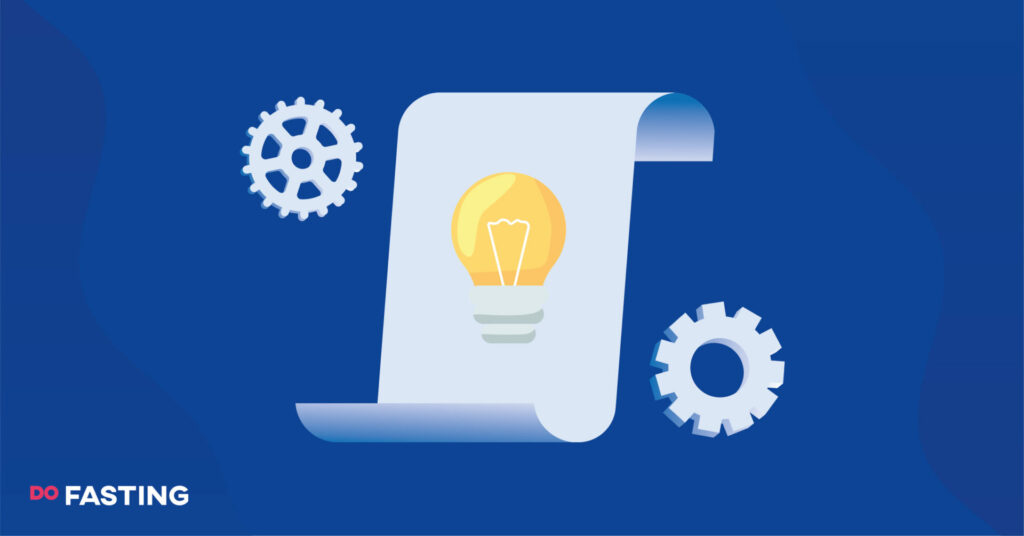Contents
Fasting cures cancer?
Understandably, you’re not yet convinced and thinking “fasting cures cancer? Right…” Cancer is incredibly complicated, after all.
In addition to cancer not being a single disease, each variety of cancer differs significantly from the other as well. Your concerns will be addressed soon.
But first, let’s take a step back and explain what intermittent fasting is.
Take a
1-minute quiz
and discover how much weight you can lose with DoFasting!

What is intermittent fasting?
Intermittent fasting is an eating pattern that cycles between periods of scheduled fasting (not eating) and eating. The most common variant of intermittent fasting is the 16:8, where you’d eat all your meals within an eight-hour window and not eat for the remaining for the day. See, not complicated at all.
So, how can this pattern of eating help with cancer treatment? Here are the four ways intermittent fasting helps with cancer:
Reverses the effect of chronic conditions
Chronic conditions – such as obesity and type 2 diabetes – are risk factors for cancer. Research has demonstrated the link between the two health disorders mentioned earlier and the higher risks of multiple types of cancer and lower survival rates.
In line with this argument, if we could somehow reverse the progression of obesity and type 2 diabetes, we could, in turn, prevent cancer. But how?
Well, through intermittent fasting. A 2014 study on time-restricted found that it protects mice against obesity and metabolic diseases, such as type 2 diabetes.
Therefore, the findings above suggest that fasting may be a probable cure for cancer.
Promotes autophagy
Autophagy is a cellular process in which your body breaks down parts of cells for later reuse. Not only is autophagy critical for maintaining proper cell function, but it also helps defend cells in the body.
This process is believed, based on several studies performed on mice, to be able to prevent cancer; this is because the studies demonstrated a correlation between a lack of autophagy and lower levels of cancer-suppressing genes. Is there an easy way to boost autophagy levels?
A 2017 study performed on mice says yes: the researchers found a positive correlation between intermittent fasting and an increase in autophagy levels. As such, it’s hypothesized that time-restricted eating can decrease the risk of cancer.
Read more: Autophagy: Learn About The Ultimate Cell Healing Process
Improves the quality of life during chemotherapy
The possibility that fasting could improve cancer patients’ quality of life during chemotherapy may surprise you, but it’s true.
According to a 2018 study done on breast and ovarian cancer patients, the practice of fasting improved their tolerance towards chemotherapy. More specifically, the participants reported fewer chemotherapy-induced side effects and higher energy levels in comparison to those who did not fast.
In addition to improving patients’ quality of life, it is also worth mentioning that a combination of fasting and chemotherapy has been shown to slow the progress of breast and skin cancer.
A 2016 study found that the combined treatment methods stimulated higher production of common lymphoid progenitor cells (CLPs) and tumor-infiltrating lymphocytes. Now – why does this matter? Well, CLPs are the precursor cells to lymphocytes – white blood cells – that are known for killing tumors.
The above study also noted that short-term fasting enhances cancer cells’ sensitivity to chemotherapy while protecting healthy cells.
Boosts the immune system to better fight cancer
As you most probably already know, stem cells are incredibly important to us due to their regenerative abilities. In a 2014 study, researchers found that fasting can activate the renewal and repair of stem cells from the immune system.
In addition to reducing damage to cells, the study also demonstrated intermittent fasting’s ability to replenish white blood cells and replace damaged ones. Don’t know what white blood cells are?
Well, white blood cells are the defenders of your body; they fight infection and eliminate potential disease-causing cells.
One of chemotherapy’s common side effect is a decrease in the number of white blood cells in a patient’s body. As a result, the person with cancer faces a much more challenging time when it comes to warding off infections and recovering from cancer.
Thankfully, as mentioned earlier, fasting has been shown to increase stem cell production in the body, leading to a rise in white blood cell levels.
Take a
1-minute quiz
and discover how much weight you can lose with DoFasting!

Preventing headaches when fasting
Are you now convinced of intermittent fasting’s benefits on cancer? Wait – before you go ahead and incorporate this eating pattern into your daily life, here’s a warning.
Fantastic as it is, fasting comes with side effects, and pesky headaches are one of them. But of course, you shouldn’t deny yourself from reaping the benefits of intermittent fasting because of headaches.
And besides, there are a couple of ways to prevent them from striking you once you’ve figured out the reason behind them.
Cause #1 – Low blood sugar
Intermittent fasting restricts the number of hours you can eat. Undoubtedly, this would lead to you consuming fewer calories than you typically would.
The decrease in calories can lead to low, circulating blood sugar – a common cause of headaches. While your body will eventually adjust to the lower calorie intake over time, you can also take matters into your own hands by making changes to your menu.
During your eating window, try allocating more of your calories to fats, rather than carbohydrates. Doing so will wean your body off its reliance on sugar as a fuel, and you’d be less likely to experience severe fluctuations in blood sugar when you fast.
Here are a few good sources of dietary fat if you suspect that you’d be plagued with headaches:
- Avocados
- Cheese
- Dark chocolate
- Fatty fish
- Nuts
Cause #2 – Dehydration
It can be easy to forget about water intake when you’re amid your fasting. But your body requires the proper balance of electrolytes and fluid for proper functioning. When you lose water (through daily activities) faster than it can be replenished, you run the risk of becoming dehydrated.
When your body is dehydrated, your brain can temporarily shrink or contract from the fluid loss. As a result, your brain pulls away from the skull, causing pain – a term known as a ‘dehydration headache.’ And this is why it is incredibly essential to watch your water intake when it comes to intermittent fasting for cancer benefits.
You should aim to drink at least half of your body weight in fluid ounces per day as a baseline. So, for example, if you currently weight 160 pounds, you’d need to consume at least 80 ounces of water per day.
However, do keep in mind that you might need more fluids than is recommended by these general guidelines. Adjust your water intake according to your climate, exercise, and personal needs.
For all the beer-lovers: take note that alcohol does not count! Why? Well, because alcohol is exceptionally dehydrating; it would do absolutely nothing in preventing fasting-related headaches.
Bottom line
The growing body of scientific literature in animal studies on intermittent fasting shows that it has the potential to prevent cancer.
Furthermore, intermittent fasting can play a role in cancer treatment itself as it can reduce chemotherapy-induced side effects. So – if you’ve been on the fence when it comes to practicing intermittent fasting, here’s one more benefit to add to your ‘pros’ argument.
And as long as you watch your dietary intake of fats and daily consumption of fluids, you’d be free of any fasting-related headaches.
Intermittent fasting has got a whole lot going for it; are you ready to reap its benefits?
Take a
1-minute quiz
and discover how much weight you can lose with DoFasting!

See how DoFasting will improve your life
Find out what works for you with this 60-sec quiz approved by our experts and get your personal revolutionary fasting assistant.
Start the Quiz














